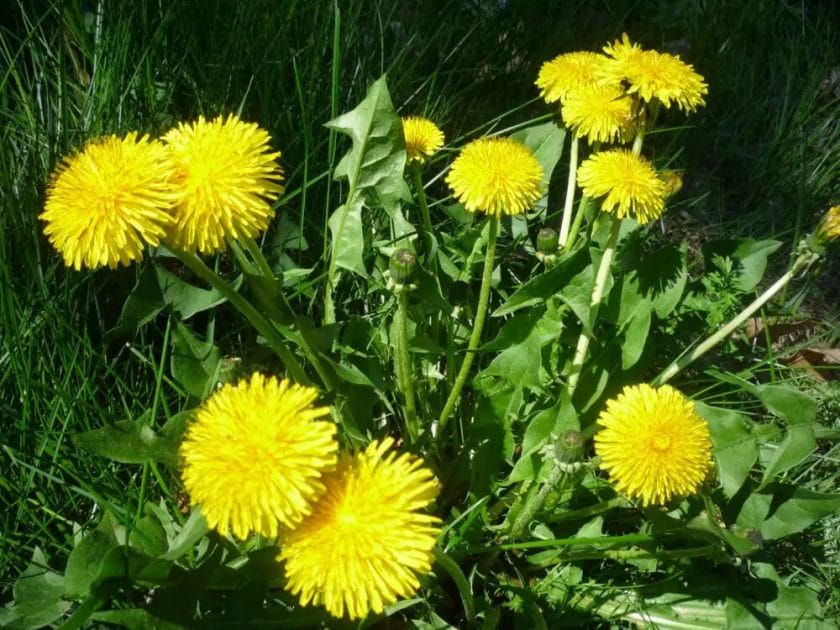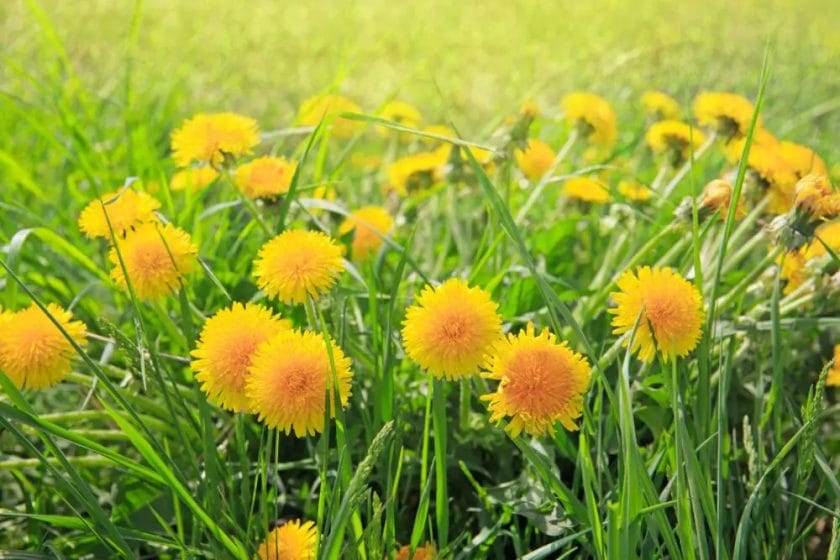Dandelions, with their bright yellow petals and fluffy seed heads, are not only a common sight in fields and meadows but also have several benefits for horses.
The leaves of dandelions are rich in nutrients, including vitamins A, C, and K, as well as minerals like iron and calcium, which can support a horse’s overall health and well-being.
Furthermore, dandelions can act as a natural diuretic, aiding in kidney function and potentially reducing the risk of urinary tract issues in horses.
However, it’s important to monitor the quantity of dandelions consumed by horses, as they can be high in sugar content. Consulting with a veterinarian or equine nutritionist is recommended to ensure a balanced diet.
Overall, when given in moderation, dandelions can be a beneficial addition to a horse’s diet, providing valuable nutrients and potential health advantages.

Incorporating Dandelions into a Horse’s Diet
Dandelions are not just pesky weeds; they can actually provide numerous health benefits for horses when incorporated into their diet. In this section, we will explore the benefits of dandelions for horses and how to safely introduce them into their daily meals.
Benefits of Dandelions for Horses
Dandelions are rich in essential vitamins and minerals that can support a horse’s overall health and well-being. Here are some key benefits of incorporating dandelions into a horse’s diet:
- Nutritional Content: Dandelions are packed with vitamins A, C, and K, as well as minerals such as calcium, iron, and potassium. These nutrients can help strengthen a horse’s immune system and promote healthy bone density.
- Digestive Aid: The high fiber content in dandelions can aid in proper digestion for horses. It can help regulate bowel movements, prevent constipation, and promote a healthy gut flora.
- Anti-Inflammatory Properties: Dandelions contain natural anti-inflammatory compounds that can help reduce inflammation in the horse’s body. This can be particularly beneficial for horses dealing with arthritis or other inflammatory conditions.
- Detoxification: Dandelions act as a natural diuretic, helping to flush out toxins from a horse’s system. This can support the overall detoxification process and promote optimal kidney function.
Safely Introducing Dandelions into a Horse’s Diet
While dandelions can offer great health benefits, it is important to introduce them to a horse’s diet slowly and carefully to avoid any adverse reactions. Here are some steps to follow when incorporating dandelions:
- Start with Small Quantities: Begin by offering a few dandelion leaves or flowers to your horse. Monitor their response for any signs of allergies or digestive upset.
- Gradually Increase the Amount: If your horse tolerates dandelions well, you can slowly increase the quantity over time. This will allow their digestive system to adjust to the new addition.
- Mix with Regular Feed: To make it easier for your horse to consume dandelions, consider mixing them with their regular feed. This will help mask any unfamiliar taste.
- Ensure Freshness and Quality: Only offer dandelions that are fresh and free from pesticides or herbicides. You can either harvest them from your own pesticide-free garden or purchase them from a trusted source.
- Consult with a Veterinarian: It is always a good idea to consult with your veterinarian before making any significant dietary changes for your horse. They can provide personalized advice based on your horse’s specific needs and health condition.
In summary, dandelions can be a valuable addition to a horse’s diet, providing essential nutrients, aiding digestion, reducing inflammation, and supporting detoxification. By following the proper guidelines and gradually introducing dandelions, you can ensure a safe and beneficial dietary adjustment for your equine companion.

Dandelions as a Natural Remedy for Digestive Issues in Horses
When it comes to maintaining the health and well-being of our beloved horses, a balanced and healthy digestive system is of utmost importance. Digestive issues can cause discomfort, pain, and even serious health problems in horses. While there are various medications and treatments available, many horse owners are turning to natural remedies to support their horse’s digestive health. One such natural remedy gaining popularity is the humble dandelion.
What are Dandelions?
Dandelions, scientifically known as Taraxacum officinale, are flowering plants that are often considered a weed. However, they have a long history of medicinal use in traditional herbal medicine. The entire dandelion plant, including the leaves, roots, and flowers, is rich in vitamins, minerals, and antioxidants.
How Can Dandelions Help with Digestive Issues in Horses?
Dandelions offer several benefits that can support the digestive system of horses:
- Improved Digestion: Dandelion leaves contain bitter compounds that can stimulate the production of digestive enzymes, promoting better digestion and nutrient absorption.
- Reduced Inflammation: Inflammation can contribute to digestive issues in horses. Dandelion contains anti-inflammatory properties that can help reduce inflammation in the digestive system, easing discomfort.
- Detoxification: Dandelion acts as a natural diuretic, helping to flush out toxins from the body. This can be particularly beneficial in supporting the liver and kidney functions, which play a vital role in digestion.
Ways to Incorporate Dandelions into a Horse’s Diet
There are several ways to incorporate dandelions into a horse’s diet:
- Fresh Dandelion Leaves: Horses can safely consume fresh dandelion leaves. However, it’s important to ensure that the leaves are pesticide-free and have not been exposed to harmful chemicals.
- Dried Dandelion: Dandelion leaves can also be dried and added to the horse’s feed. Dried dandelion can be easily sourced from reliable herbal suppliers.
- Dandelion Tea: Dandelion tea can be prepared by steeping dried dandelion leaves in hot water. It can be offered to horses as a soothing drink or mixed with their regular feed.
- Herbal Supplements: There are herbal supplements available in the market that contain dandelion as one of the ingredients. These supplements are specifically formulated to support digestive health in horses.
Precautions and Considerations
While dandelions can be a beneficial natural remedy for digestive issues in horses, it’s important to keep a few precautions in mind:
- Ensure that the dandelions are sourced from a safe and organic environment, free from pesticides and herbicides.
- Introduce dandelions gradually into your horse’s diet to monitor their tolerance and any potential allergic reactions.
- Consult with a veterinarian or an equine nutritionist for guidance on the appropriate dosage and usage of dandelions for your horse.
- Keep in mind that dandelion should not be used as a substitute for proper veterinary care. If your horse is experiencing severe or persistent digestive issues, seek professional veterinary advice.
Summary
Dandelions can be a natural and effective remedy for digestive issues in horses. Their unique combination of digestive stimulant, anti-inflammatory, and detoxifying properties makes them a valuable addition to a horse’s diet. However, it’s important to source dandelions from a safe environment and introduce them gradually, while consulting with a professional. By taking these precautions, you can harness the power of nature to support your horse’s digestive health.

Dandelion Supplements for Improving Coat and Hoof Health in Horses
In this section, we will explore the benefits of using dandelion supplements to improve the coat and hoof health of horses. Dandelion, also known as Taraxacum officinale, is a flowering plant that is commonly found in many parts of the world. It has been used for centuries in traditional medicine and is known for its numerous health benefits.
1. Nutritional Profile of Dandelion:
Dandelion is a rich source of vitamins and minerals that are essential for maintaining the overall health of horses. It is packed with vitamins A, C, and K, as well as minerals such as calcium, potassium, and magnesium. These nutrients play a vital role in promoting healthy skin, coat, and hooves in horses.
2. Promotes Healthy Coat:
Dandelion supplements can greatly improve the condition of a horse’s coat. The vitamins and minerals present in dandelion help nourish the skin, preventing dryness and flakiness. This ultimately leads to a healthier and shinier coat. Additionally, dandelion is known for its anti-inflammatory properties, which can help soothe any skin irritations or allergies that may cause coat problems.
3. Strengthens Hooves:
The health of a horse’s hooves is crucial for its overall well-being. Dandelion supplements can help strengthen and maintain the health of the hooves. The minerals found in dandelion, such as calcium and magnesium, are essential for strong hoof growth. Additionally, dandelion’s anti-inflammatory properties can help alleviate any hoof-related inflammation, such as laminitis.
4. Detoxification and Immune Support:
Dandelion has natural detoxifying properties and acts as a mild diuretic, helping to eliminate toxins from the body. A healthy immune system is essential for maintaining optimal coat and hoof health in horses. The vitamins and antioxidants present in dandelion can boost the immune system, helping horses fight off infections and diseases.
5. Administration and Dosage:
Dandelion supplements for horses are available in various forms, including powdered extracts, capsules, and liquid tinctures. The dosage will vary depending on the horse’s weight, age, and specific health needs. It is recommended to consult with a veterinarian or equine nutritionist to determine the appropriate dosage for your horse.
In summary, dandelion supplements can be a beneficial addition to a horse’s diet to improve coat and hoof health. The rich nutritional profile, anti-inflammatory properties, and immune-boosting benefits of dandelion make it a natural choice for promoting overall well-being in horses. However, it is important to consult with a professional before introducing any new supplements to your horse’s diet.
Precautions and Considerations When Feeding Dandelions to Horses
While dandelions can be a nutritious and easily accessible food source for horses, it is important to take certain precautions and considerations when incorporating them into their diet. Here are some key points to keep in mind:
1. Quality and Purity:
Ensure that the dandelions you feed to your horses are free from pesticides, herbicides, and other harmful chemicals. It is best to pick dandelions from areas that have not been treated with any chemicals. If you are unsure about the quality and purity of the dandelions, it is advisable to refrain from feeding them to your horses.
2. Quantity:
While dandelions are generally safe for horses, it is important to introduce them gradually into their diet. Start with small quantities and monitor your horse’s reaction. Some horses may have sensitivities or allergies to certain plants, so it is essential to observe any adverse effects such as digestive issues or allergic reactions. If your horse tolerates dandelions well, you can gradually increase the amount over time.
3. Variety in Diet:
Dandelions should be considered as a supplement to your horse’s regular diet rather than a primary source of nutrition. Horses require a well-balanced diet that includes a variety of grasses, hay, and other feed. Dandelions can add diversity to their diet and provide additional nutrients, but they should not replace essential components of their overall feeding regimen.
4. Soil Conditions:
It is crucial to be cautious of the areas where dandelions are sourced from. Avoid picking dandelions from areas that have been exposed to potentially contaminated soil, such as near roadways, industrial sites, or pastures treated with chemical fertilizers. Contaminated soil can contain harmful substances that may pose a risk to your horse’s health.
5. Veterinary Consultation:
If you are considering introducing dandelions or any other new food into your horse’s diet, it is recommended to consult with a veterinarian. They can provide expert advice tailored to your horse’s specific needs and help you determine the appropriate quantity and frequency of dandelion feeding. A veterinarian can also assess your horse’s overall health and advise if there are any specific dietary restrictions or contraindications.
In summary, while dandelions can be a valuable addition to your horse’s diet, it is crucial to exercise caution and consider the aforementioned precautions. By ensuring the quality, quantity, and variety of their diet, as well as consulting with a veterinarian, you can safely incorporate dandelions into your horse’s feeding routine and provide them with additional nutrients and enrichment.
FAQs
Are dandelions good for horses?
No, dandelions are not considered good for horses. While they are not toxic, the high sugar content can contribute to weight gain and metabolic issues. Additionally, dandelions can cause bloating and digestive upset if consumed in large quantities.
Conclusion
In conclusion, dandelions can be beneficial for horses in moderation. While they are commonly considered as a weed, dandelions offer several health benefits for equines. The flowers and leaves of dandelions are rich in various nutrients, vitamins, and minerals that can support the overall well-being of horses. However, it is essential to control the intake of dandelions to prevent overconsumption, as excessive amounts may lead to digestive issues. Consulting with a veterinarian or equine nutritionist is recommended to determine the appropriate quantity of dandelions to include in a horse’s diet. So, consider incorporating dandelions as a nutritious addition to your horse’s diet, but always monitor their intake.
